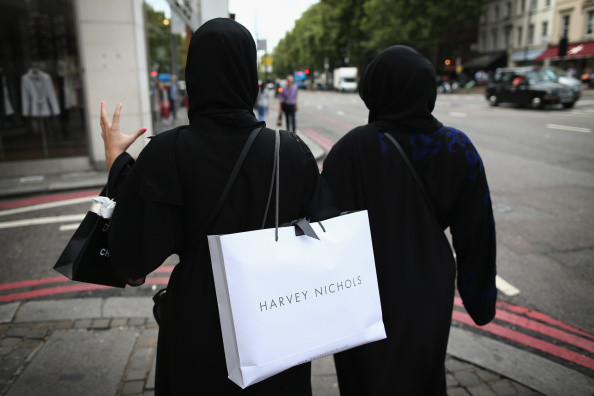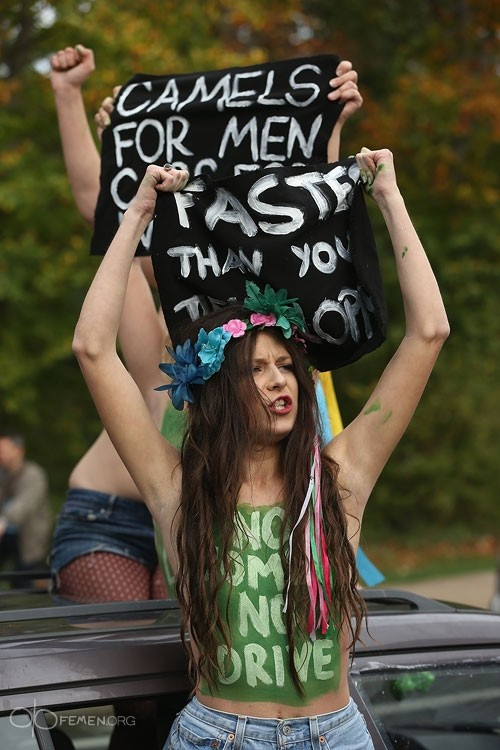Women in Saudi Arabia: Western feminists won't save us - their bullying ignorance reduces us to mere hymens

Egyptian-American Arab Spring journalist Mona El-Tahawi sparked a great deal of controversy in 2012 when she published a divisive article about men's treatment of women in the Arab world titled: "Why do they hate us?".
Her latest book Headscarves and Hymens is likely to have a similar affect. El-Tahawi is not the first Muslim woman to explore elements of her faith or the practices of some its members for a Western audience in English and she won't be the last. But such debates always attract attention.
I am in no place to critique either El-Tahawi's book or her work - or the work of any of her literary and ideological compatriots, for that matter - but I do wish to call attention to the phenomenon that they represent: The age of the brown-ish-white saviour industrial complex.
This is a sisterhood of traveling, one-size-fits-all, Anglophone McFeminism, new and improved to include mascots who look like you but touting a message more designed to comfort Western lay-feminists and exclude you than it is to challenge your thought.
I do not deny that there is a unique set of circumstances that make the human experience harder or more humiliating for women in certain parts of the world than others. But just like many do not appreciate that Africa is not one country but a diverse and varied continent, so far too many generalise about the thousands of different cultures, traditions, languages and religious practices in what is known collectively as the Muslim World.

I am not here to apologise on behalf of misogyny or rehash the exhausted trope of burka vs. bikini and you will not catch me regurgitating recycled buzzwords such as "evolution not revolution!". I know very well that the status quo can be especially unforgiving for women to varying degrees in the Arab or Muslim world.
I know very well that life is easier for me in New York, for example, than it is in my hometown of Riyadh, Saudi Arabia. I am enraged that my autonomy has been confiscated by a system all too happy to weaken and control me via the driving ban and guardianship laws.
But a revolution inspired solely by Anglophone feminism, whether championed by a Muslim woman or otherwise, is not a sisterhood: it is an exclusionary missionary bordering on neo-colonialism.
I lived in New York City for over five years, initially for school and later to work. I considered the female friends I made there sisters. We bonded over our shared feminism and witnessed the complicated trials and tribulations of the female experience together. I too believed in the sisterhood.
Imagine my shock, then, when a well-educated, well-travelled, fellow woman-of-colour recently asked me if I had ever been submitted to a forced virginity test. And if not, had it been because my father was gracious enough to allow my exemption?
A revolution inspired solely by Anglophone feminism, whether championed by an Arab/Muslim woman or otherwise, is not a sisterhood, it is an exclusionary missionary bordering on neo-colonialism.
This didn't just surprise me because she too was a woman of colour and I was under the impression that she understood the perils of over-simplifying "minority" issues, but also because this specific practice is so foreign to Saudi culture.
It is not even common in the countries surrounding Saudi Arabia. It was devastating to realise that we, indeed, are interchangeable brown/black damsels in distress to all Western women, those of colour included.
This is not a sisterhood
I wanted so badly to believe in this sisterhood, but a sisterhood that actively and aggressively wanted just as badly to reduce me to a hymen, to exclusion, to a recipient of male benevolence whether daughter or wife, and to otherness is not a sisterhood.
A sisterhood that robs me of my agency, undermines my role in shaping the outcomes of my own life, refuses to understand my choices, and capitalises on my misery at Barnes and Noble is not a sisterhood. It is a bully and a voyeur. This modern McFeminism reduces the work of great Arab feminists, whose books you'll find only at university campuses or foreign book shops, if at all.

'Like Nasser's Pan-Arabism before it, Iran's influence in Arab countries will now experience its death in Yemen, through the efforts of Saudi Arabia. Pan-Arabism, however, was a potent threat that could not be countered by military means alone. It required an equally attractive and moving ideology, which was the role Pan-Islamism played.'
Read Farah's appraisal of Saudi expansionism here.
Another aspect of the brown-ish white saviour discourse is lazy comparisons between, for example, the struggle of Arab women against patriarchy and the US civil rights movement.
References to "the Saudi Rosa Parks" or "the Egyptian Harriet Tubman" do more to cater to Western sentiments than honour their recipients. They also muddle two very different causes: the US civil rights movement and feminist activism, whose intersectionality is still a subject of great debate in societies considered far more progressive than ours.
In a time when Muslim and Arab countries have become known as little more than hotbeds of either extremism or mass consumerism , are we also at a want for feminist and civil rights heroes to import?
El-Tahawi herself said in an interview with New York Times Magazine last week that she cannot leave Islam because her biggest inspiration is Khadijah, the first believer in Islam and the Prophet's wife, a woman who 1,436 years ago owned her own business and proposed to a man 15 years her junior, whom she employed.
It is also problematic to confuse the two because nowhere in the history of the civil rights movement have women alone been encouraged to engage in Tahawi-styled warfare with the networks they have cultivated their whole lives. These are not slave masters, neo-Nazis or Klansman. These are family members, fathers, husbands, brothers.
When another friend from New York asked for contacts for a documentary on Saudi women recently, I voiced my discomfort politely but did ask co-workers and friends if they wanted to speak with a Western journalist about their lives.
"Will she get me a green-card to get out of here?" asked one. "Otherwise what is the point? It's not a zoo."
So the next time a representative of the brown-ish white saviour complex asks me what I plan to do to "change the way things are" for women in my country, perhaps my only response will be to film a documentary about women in Brooklyn. Because, in the end, the worth would be the same as any English language film, book or peep-show on Arab or Muslim women. That is to say, nothing.
Farah Abdulaziz Al-Sweel is a Saudi commentator based in Riyadh and London. She can be found on twitter at: @FarahAlSweel
© Copyright IBTimes 2025. All rights reserved.





















